- Home
- Cornelia Funke
The Glass of Lead and Gold Page 2
The Glass of Lead and Gold Read online
Page 2
Ofelia Fuentes used her left hand to inspect the three slightly bent coins Tabetha had put on the counter. It was her only hand. Ofelia Fuentes’s right arm ended shortly under the elbow, but one soon forgot that when watching her move swiftly behind the counter.
“Keep that one,” she said, handing one of the coins back to Tabetha. “You may get more than a soup for that, from the collectors on Celt Street.” She had quite a deep voice for a girl, and her accent made even plain words sound somehow mysterious. “The other two are fine,” she said to the Hob who was filling the bowls.
The portion was even bigger than usual.
“Our Christmas Eve portion,” Ofelia commented, pushing the bowl over the counter.
Christmas. None of the men and women at the tables seemed to care. Tabetha remembered how, on their first Christmas in Londra, her mother had taken her to the big tree in front of the Queen’s palace. It’d had so many living lights in it: Hobs, Will-o’-the-Wisps and swarms of Grass and Water Elves. Her mother had always wrapped something up for Tabetha—even if it was only an old toy, she would make it look new by adding some ribbon or bird feathers.
The drunken guest had returned to his table, but he was yelling at everyone in a language Tabetha didn’t know. Ofelia Fuentes kept her calm, but when he banged his fist down on his plate so violently that it broke, she merely cast a glance at the kitchen door and he left without any further demonstrations of anger.
Tabetha wondered whether the Fuentes themselves had spread the tale about the Troll in their kitchen.
She took her time eating her soup—although her hunger didn’t make it an easy task—all the while hoping Ofelia’s mother would show up, but she didn’t. Outside, the snow was once again falling densely, and one could hear the wind sing a chilly Christmas song in the narrow street overlooking the river. So there was even more protest than usual when the Hobs rang the rusty bell on the wall, which told everyone it was closing time.
“Do you always eat this slowly?” Ofelia Fuentes asked, when the tables were finally empty and Tabetha was still sitting at the counter, scraping the last remains of her soup out of her bowl. “Is the soup not to your liking today?”
“Where’s your mother?” Tabetha asked.
Ofelia nodded at the Hobs, and they jumped onto each other’s shoulders to lock the door.
“She went back to Metagirta, where most of our family lives. She can’t stand the cold. She complains about it all day long. Sometimes she’s gone for months. One never knows. Why? Are you one of those people who need her advice to get through life? My father says my mother draws them like moths to a flame.”
Tabetha cast her a cold glance, and swallowed her question of whether Mister Fuentes really worked for the Queen.
Ofelia walked over to the table where the angry guest had sat, and gathered the broken pieces of his plate with her one hand. Tabetha was almost tempted to offer to help. Almost. But, as Tabetha never asked for help herself, she resisted the temptation.
“What’s your name?” Ofelia’s eyes were as black as a piece of coal.
“Ted.”
“Ted what?”
“Brown.”
“Ah, marrón. That’s what you’d be called in our language.” Ofelia put the broken pieces of plate onto the counter. “It sounds better, doesn’t it? Our last name means ‘fountains’. Very appropriate for a gardener, my father always says. I guess it even fits a soup kitchen, somehow.” She wiped some soup from the counter. “So… what did you want my mother’s advice on?”
Tabetha hesitated. She was not sure she liked this girl, and she really didn’t know her at all. But who else could she ask?
“There was a man on the river bank today,” she began. “He said he’ll pay three silver shillings if I find a shard of this glass.” She pulled the clipping out of her pocket. “Do you know what’s so special about it?”
Ofelia looked at the clipping. “Did he say his name, the man?”
“Bartholomew something.”
“Bartholomew Jakes. Oh yes. He always shows up around Christmas.” Ofelia filled a bowl with soup and reached for a spoon. “He’s a treasure hunter. Sometimes there’s a dozen of them down by the river at this time of year. I’ve no idea why they believe they’ll find the glass around here. It isn’t exactly the nicest part of the embankment.”
A treasure hunter, of course. Tabetha felt quite stupid that she hadn’t figured it out herself. Hunting for magical objects—Arthur’s Sword, Sleeping Beauty’s Bed, Rapunzel’s Hair, a Kelpie’s Hoof—and selling them to the rich and powerful was a well-rewarded trade, for there was nothing more desirable in this world than the power that true magic could grant. What better job could there be? However, Tabetha was quite sure being a treasure hunter was another job women weren’t allowed.
“So, that glass”—she said, making her voice sound as if she didn’t care a bit—“it can do real magic? Not the fake kind all those false Witches sell at Seven Dials?” When Ofelia Fuentes gave her a long, enquiring look, Tabetha quickly lowered her head—but she obviously wasn’t as good at concealing things as she believed.
“Oh look at you!” Ofelia uttered a soft laugh. “I think you already found a piece!” She leant over the counter, casting the Hobs a quick glance. They were known for their gossiping. “Congratulations,” she whispered. “That’s quite a find. The glass which Jakes is looking for… it’s called the Glass of Lead and Gold. There’s always talk about it around this time of year, as it’s supposed to work its magic only on Christmas Day.”
The Glass of Lead and Gold? It didn’t sound too promising. Especially the lead part.
“What does it do?” asked Tabetha. Everyone knew a Witch’s Comb turned you into a bird, and a Table of Plenty filled itself with food whenever you needed it. But, a glass?
Ofelia Fuentes shrugged her shoulders. “They say it makes the miserable rich, whatever that means. But there are lots of stories about the glass.”
“What stories?”
Ofelia put a few dirty glasses into the sink and signalled for the Hobs to wipe them dry. “Last Christmas, the newspaper that clipping comes from wrote that the Fairies made the glass. The ones who disappeared when all their lakes froze over. But those journalists come up with a new story about it every Christmas.”
“You read newspapers?” Tabetha had never heard of a woman who did. Her mother certainly hadn’t.
Ofelia shrugged her shoulders. “I got into the habit when my father had me wrap elfenflower bulbs in old newspaper pages. He got quite upset when he caught me reading instead of working, but those moods never last long with him, and now he buys me a newspaper every morning.”
She scooped a Hob out of the soup water with her handless arm. It had slipped on the wet counter.
“This Christmas,” she said, while throwing a towel over him, “they quoted an antiques dealer who swears an Alderelf made the glass and threw it into the river on purpose, to make the Themse deliver it as a very special Christmas present. It sounds like a silly tale to me, but who knows? People say many terrible things about those Elves—this is a nice story, for a change.”
Alderelves, Fairies… People talked about them all the time, but nobody ever saw them, and Tabetha very much hoped that none of them existed. Who wanted immortals around—creatures who were far more powerful than any human could ever be and, if the tales were true, deadly cruel and scheming? Her mother had talked about them all her life, especially about the Mirrors of Magic, which the Alderelves had supposedly built for travel to another world. “That world is almost like ours,” she had whispered into Tabetha’s ear, cradling her in her arms against the cold, in the miserable basement room where Tabetha had watched her die. “But Londra is called London and the houses are all as shiny as the palace of the Queen, made from glass and silver. There are no Gold Ravens there to curse you, no Mermaids luring poor fishermen like your father to their deaths, no Thumblings, who steal the little you have. Only normal people, who eat and d
rink whatever they want and never get sick or old.”
Tabetha had always thought she would miss the Thumblings and Mermaids, and even the Gold Ravens. Once, her mother had believed she had spotted one of those magical mirrors through the window of an antiques shop. Tabetha still remembered how she had dragged her through the door. The frame of the mirror was covered in silver roses, as the Mirrors of Magic were described, but before her mother could touch the glass, the shop owner had dragged them both back. Nowadays, Tabetha sometimes sold him the coins she found. He didn’t recognize her in her boys’ clothes, of course. He probably didn’t even remember grabbing her mother and pushing her out his door so hard that she hurt her knees on the cobblestones. But Tabetha remembered, and she never brought the really old coins to him.
Ofelia Fuentes washed the last glass and handed it to the Hob, who was still trying to dry his soaked clothes with the towel. Hobs were always impeccably dressed, in suits and dresses that often copied the clothes worn by servants in rich households. Another one emerged from the kitchen, using the Hob-flap in the door. He climbed up Ofelia’s dress, jumped onto her shoulders and whispered something into her ear. Ofelia nodded, as she handed the newspaper clipping back to Tabetha. The nails on her one hand were painted red and green. Maybe she liked Christmas? Or maybe she was just making fun of it. It was hard to read those black eyes.
“Tell her to stay,” Tabetha heard her say to the Hob. “I may need her later on.”
The Hob nodded and disappeared again through the kitchen door, while Ofelia chased a Dust Elf from her nose. When their wings caught the light, they shimmered in all the colours of the rainbow.
“If you want my advice, although it’s not my mother’s: don’t tell anyone you found a piece of that glass.”
“Of course not. How foolish do you think I am?”
“Well, you told me.”
Oh, Tabetha was really not sure she liked this girl.
“Though just a shard probably won’t do anything anyway.” Ofelia took another spoon from the bowl she had filled for herself. “I am sure you need to make it into a new glass to make the magic work.”
Of course. Tabetha was very irritated with herself for not having thought about that.
“Do you like to dress like that?” Ofelia pointed at Tabetha’s coarse pants and jacket.
Tabetha froze. “What are you talking about?” She couldn’t help but sound hoarse with embarrassment.
Ofelia looked straight into her eyes, so that Tabetha didn’t know how to return her gaze.
“Nobody notices, right? Because people are stupid.”
Ofelia raised her handless left arm and wiped a Will-o’-the-Wisp off her cheek. “They look at you, and they don’t really see you. But I do. ‘Ofelia,’ my mother always says, ‘don’t look too closely at the world.’ How? I always wondered how it feels to have short hair. It takes me ages each morning to brush mine.”
Tabetha was not sure how she felt. Relieved, that someone knew? Or irritation that her secret had been revealed so bluntly? “It keeps the lice away,” she replied coolly. And the hands of men, Tabetha added in her head. Although she wasn’t sure whether Ofelia Fuentes would appreciate that effect. What was the lipstick for, and the rouge, if not to draw those hands?
“And I like my clothes,” she added. “I always found dresses annoying. My father wouldn’t take me on his boat, because one drowns in them more easily.” Not that his clothes had saved him, nor the strength of men, which he had taken so much pride in.
“Your hair looks as if it would be beautiful if you ever let it grow.” Ofelia drove her hand through her chestnut hair. “I always wanted red hair. Like the Witches.” She wore her hair up like a grown-up woman. Tabetha had to admit that she liked the look of it, and the glow the Will-o’-the-Wisps gave it. She tried to imagine herself like that, with a tight dress instead of the layers that hid her growing breasts, red lips and…
… one hand.
Ofelia pulled the lace of her sleeve over her left arm. She seemed to not care at all, but maybe she remembered it when she talked to someone she didn’t know well?
“If you want, I can take you to a glass-blower—the one who fixes our broken bowls and glasses.”
Tabetha pushed the clipping back into one of her pouches. “Thank you,” she murmured. “I’ll think about it.”
But she wouldn’t. The services of a glassblower were far too expensive. Never mind, she told herself, to take the sting out of her disappointment. I can still sell the shard to that treasure hunter for three silver shillings. And the magic is probably not that powerful anyway, considering what it’s called.
Two of the Hobs had started a fight on the counter. When they pushed Tabetha’s empty bowl over the edge, Ofelia stopped them with a few sharp words. Hobs love to fight. They are much stronger than their size suggests; so strong that some men made them fight dogs for bets. Even the Queen was said to love watching those fights. Limpey claimed she’d had an arena built in her palace especially for it, and that the Hobs survived surprisingly often, although the only weapon they were allowed to carry was a sewing needle.
“Fighting Hobs, and angry guests… Something always gets broken here.” Ofelia watched, with a frown, as the Hobs cleaned away the remains of the bowl. “That one is lost, but what if I take the broken things that still have a chance to the glass-blower and pretend your shard is just one of mine, to evade any questions?”
Outside, the snow was still falling. Some of the flakes clung to the windows—Snow men and Snow women, their fragile bodies shimmering like crystals. They could spread a delicious warmth in your hands if you managed to catch one, but you had to be very careful as their limbs were as sharply edged as razors.
Don’t trust anybody, Tabetha. Those words were the only heritage Tabetha’s mother had left her, along with an old scarf. She had whispered them with her last breath, and Tabetha had tried to follow her advice. But it’s hard to live that way, and one day she’d been so lonely that she trusted an older boy. He had sold her to the chimney sweep, who lit a fire beneath her when she didn’t climb fast enough. Why would she trust a girl she barely knew, who had a strange accent and painted the fingernails of her one hand red and green?
“Okay,” Tabetha murmured. “Where is this glass-blower’s place? On Crystal Lane?” Most of them were.
“Yes, number twenty-three. Do you have the shard on you?”
Tabetha shook her head with a contemptuous smile. Of course not. Only fools kept their finds on them.
“You want me to come with you and get it?” Ofelia asked. “Christmas doesn’t make the streets of this city any safer, and this shard may prove to be quite a valuable piece.”
“No, that’s fine,” Tabetha said. Don’t trust anyone. “I’m used to being on my own.” And I doubt a one-handed girl in a nice dress would be much help.
“Dip the shard in the snow,” Ofelia called after her. “If it doesn’t melt, it is not what you think. At least, that’s what the newspapers say.”
AFTER THE WARMTH INSIDE THE INN, the cold cut through Tabetha’s rags like a razor, a sharp reminder that it was not good to get spoilt by staying inside so long. Even the moon was hanging above the roofs like a piece of ice, and Tabetha was grateful the place where she hid her finds was not too far away. Like most mudlarks, she kept her treasures a safe distance from where she slept, as thieves could follow her there too easily. The streets were crowded with families and carol-singers, and beggars who hoped for mercy on Christmas Eve. Toymakers were selling their tin soldiers and music boxes from brightly coloured carts, and starving musicians played the songs of the season, more or less well, with their frozen fingers. At first, Tabetha stopped at every corner—as was her routine, to make sure no one followed her—but she soon gave up on that, as it was impossible to spot anyone in the river of faces floating through the city.
Not everything mudlarks dig out from the mud sells, but they all kept some of those finds nevertheless. Sometimes, the frag
ment of a glazed plate granted a glimpse at a time long-forgotten or at the world beyond their grasp, where people ate with silver spoons from beautifully painted crockery. Tabetha kept her treasures safe in an empty barrel in the overgrown backyard of an abandoned house whose brick walls were marked by a fire. The bakery sign still swung on rusty chains beside a boarded-up door at the front, and the old woman who often sat on the stairs in front of the house next door told everyone the house had burnt down because the baker had been so drunk that he’d fallen asleep next to his oven.
The snow was piled high between the blackened walls of the yard and when Tabetha had finally dug the barrel out of the snow, she was even more relieved than usual that the wooden box she kept inside was untouched. It was also a gift of the river. All mudlarks believed the Themse to be a living thing who, following unpredictable moods, either gave or took away, and they all regularly threw something precious back into the murky waters, to pay the river back and make sure it meant them well.
Tabetha’s wooden box held a myriad of treasures, including a broken clay pipe with a faun’s face—which she loved so much that she had never managed to sell it—a small fragment of delicate white china with a blue pattern that to her eyes resembled a dragon’s tail, and a coin with strange letters, which she had told herself had come from an ancient tribe of warriors who were all ginger-haired like herself. The broken silver chain with the small moonstones was a rare find. Most of the city’s lost jewellery was snatched up by the Toshers, scavengers who searched the sewers. Luckily, some valuables ended up in the river nevertheless, as had the ring that lay next to the chain and sadly didn’t fit any of Tabetha’s fingers. Amongst these favoured items was the piece of glass she had come for, so delicate that she’d always wondered how it had survived the river.

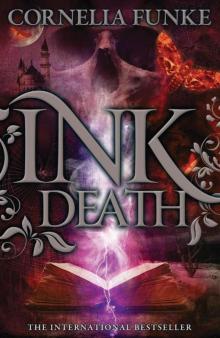 Inkdeath
Inkdeath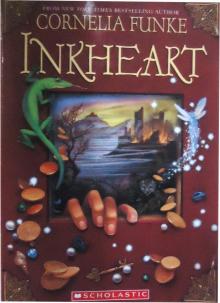 Inkheart
Inkheart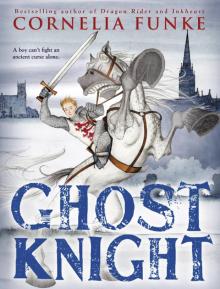 Ghost Knight
Ghost Knight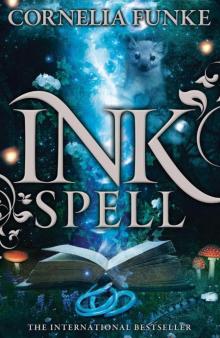 Inkspell
Inkspell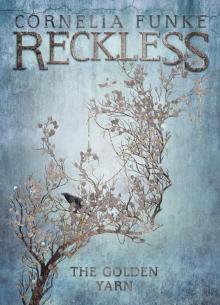 The Golden Yarn
The Golden Yarn Fearless
Fearless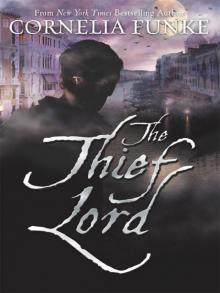 The Thief Lord
The Thief Lord The Griffin's Feather
The Griffin's Feather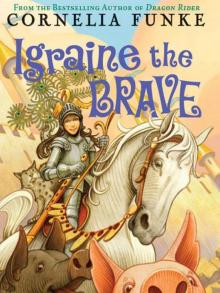 Igraine the Brave
Igraine the Brave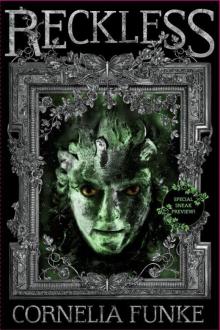 Reckless
Reckless When Santa Fell to Earth
When Santa Fell to Earth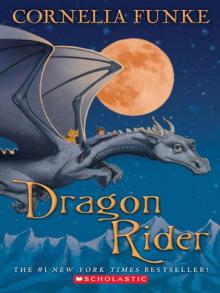 Dragon Rider
Dragon Rider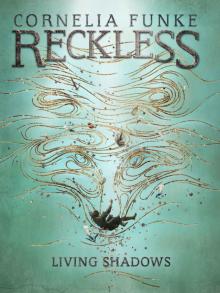 Living Shadows
Living Shadows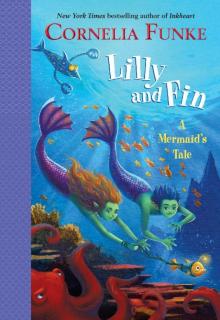 Lilly and Fin: A Mermaid's Tale
Lilly and Fin: A Mermaid's Tale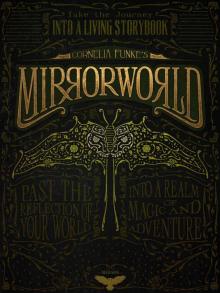 The MirrorWorld Anthology
The MirrorWorld Anthology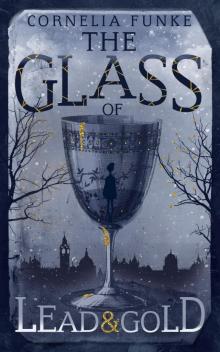 The Glass of Lead and Gold
The Glass of Lead and Gold Ghosthunters and the Incredibly Revolting Ghost
Ghosthunters and the Incredibly Revolting Ghost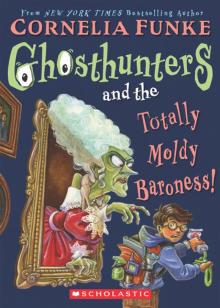 Ghosthunters and the Totally Moldy Baroness!
Ghosthunters and the Totally Moldy Baroness!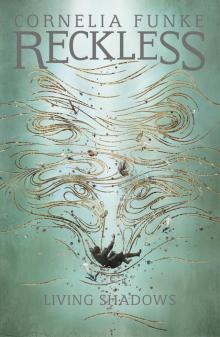 Reckless II
Reckless II Griffin's Feather
Griffin's Feather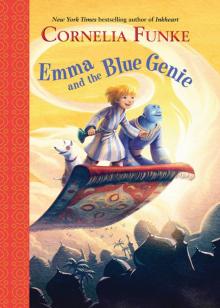 Emma and the Blue Genie
Emma and the Blue Genie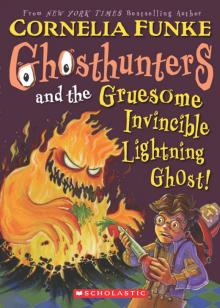 Ghosthunters and the Gruesome Invincible Lightning Ghost
Ghosthunters and the Gruesome Invincible Lightning Ghost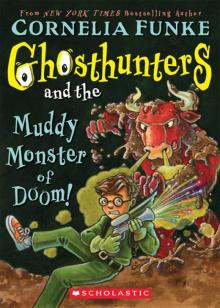 Ghosthunters and the Muddy Monster of Doom!
Ghosthunters and the Muddy Monster of Doom!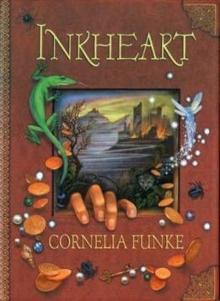 Inkheart ti-1
Inkheart ti-1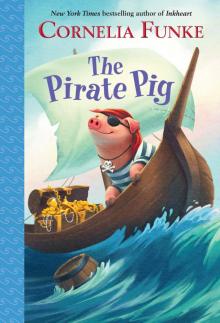 The Pirate Pig
The Pirate Pig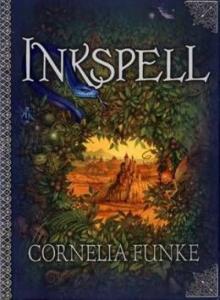 Inkspell ti-2
Inkspell ti-2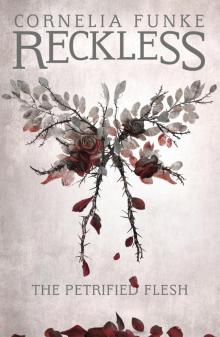 The Petrified Flesh
The Petrified Flesh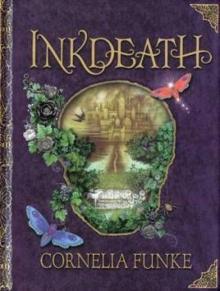 Inkdeath ti-3
Inkdeath ti-3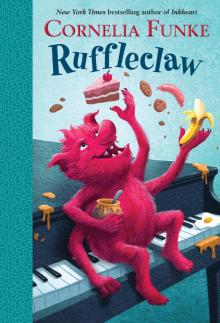 Ruffleclaw
Ruffleclaw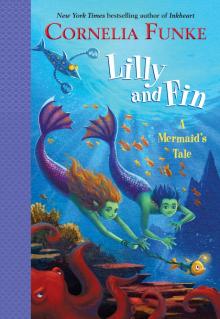 Lilly and Fin
Lilly and Fin